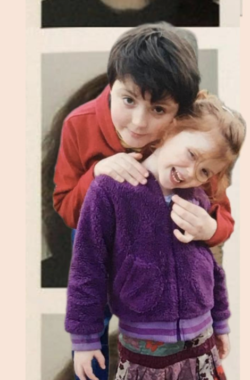by Madeleine Baber
Whilst it is mildly infuriating that one of the best analyses of the male gaze and its impact on the female psyche was made by a man, I cannot deny that John Berger hit the nail on the head when he wrote:
Men act and women appear. Men look at women. Women watch themselves being looked at. This determines not only most relations between men and women but also the relation of women to themselves. The surveyor of woman in herself is male: the surveyed is female. Thus, she turns herself into an object of vision: a sight.
When I first encountered this quote, I felt as if I suddenly understood a hither-to-unnoticed aspect of life. Where I had heard of the ‘male gaze’ before then, I had never truly grasped the concept. Once I had, there was no going back. I saw the traces of it everywhere. It pervaded every film, book, and TikTok. All my clothes were ruined. My entire childhood was reimagined under its dominance. Perhaps this is because I was struggling with my body image at the time, but for me the gaze was malignant, and it had breathed its poisonous breath onto everything I knew.
As it is for most of us who experience it, my ‘awkward phase’ was long and unbearable. Average height, above-average weight, unruly ginger hair that I desperately tried in vain to make fit the 2016-poker-straightdip-dyed-musical.ly-user aesthetic, those ridiculous rectangular plastic glasses, such as all old Tumblr users should remember well. I was, in a word, ‘frumpy.’
It wasn’t until the latter half of year ten that I purged myself of awkwardness. And once I had, as every person who’s ever shed a couple of kilos and put some layers in their hair can attest to, I noticed a tangible difference in the way my peers treated me. anymore. I had a name and a face and I won the game the gaze insisted I play, losing again always stuck around.
In my final year of college, I outgrew my favourite pair of trousers, my long hair into a curly whatever-the-fuck, and stopped wearing lifted weights. Maybe I should have seen this as liberation, but more like deterioration. For months I felt trapped under my heaviness. I looked at others and I only saw my all-too-big reflection in their eyes. In conversations, I felt myself as an overwhelming presence, a ghastly monster that everyone was simply too polite to scream at. I longed for my eyes to be taken out of my head and placed above me so that I could always observe myself, know my every angle, and know what others saw. The limits of my sense of vision were a constant torture for me.
In my life, there was an omnipresent male and he watched me and all the women around me all the time. He was my surveyor, their surveyor. He was our prison warden or still is maybe.
Berger was right. I had turned myself into a vision: a sight.
And truth be told I cannot comfortably use the past tense here. I’m not sure there is a way for a mere individual to completely throw out years of social conditioning. The gaze still exists, and the surveyor still surveys because he is both within and without, micro and macro, individual and collective.
I think, if I were to dispense some kind of wisdom into this article of mine, just in case someone needs it, I would say: yes, I am seen, but it doesn’t end there. When I’m with friends they see me. But they also hear my voice, my bad takes, my laugh. When I’m with my boyfriends, they see me. But they also feel the warmth of my embrace, the softness of my skin. They get strands of my hair in their mouths and their buttcracks. They smell me on their bedsheets long after I’ve gone. People on the street, they see me. But after that glance, I am forgotten, simply a fleeting moment to them, a waft of air, a footstep. They see me, but they also experience me. They are not my surveyors; they do not scan me in search of flaws. Nor am I a still image. No, I am not a sight, I am a presence. I am a presence that is seen on occasion but, most of the time, is felt. And the person who feels it the most is me.
So, I hope this mindset will help me ignore the surveyor even when he continues to survey. I can give up on trying to expand my field of vision to include myself. I will never be aware of what I look like all the time. Am I even remotely aware of what everyone else looks like all the time? I believe my impressions of others are far more abstract than that. And that abstractness is countless times more powerful and beautiful than any single image, or 5 lost kilos, or 10 good hair days could ever be.

